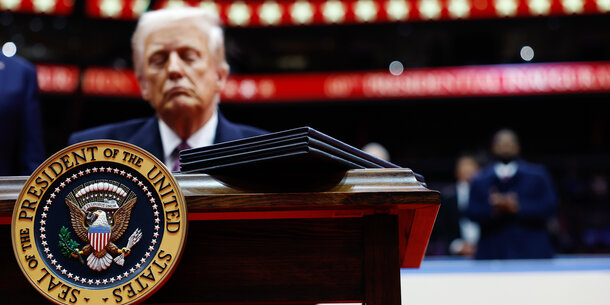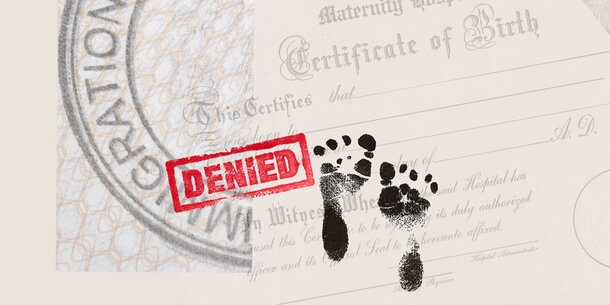The Supreme Court took a radical step with its June 2022 decision in New York State Rifle & Pistol Association, Inc. v. Bruen, ruling that “history and tradition” would determine whether laws regulating firearms are constitutional under the Second Amendment. This novel ruling — part of a broader “originalist” turn in the Court’s approach to constitutional law — has been widely criticized for its fixation on history, including by numerous judges.
In the short time since Bruen was issued, federal judges appointed by Presidents Reagan, Clinton, George W. Bush, Obama, Trump, and Biden have all questioned the opinion, warning that history is an unworkable basis for deciding constitutional questions that pushes courts toward unreliable, unreasonable, and unjust conclusions.
For example, Judge Robert Miller Jr. — whom Ronald Reagan appointed to the U.S. District Court for the Northern District of Indiana in 1985 — reluctantly applied the test to dismiss a case against someone who purchased a firearm without disclosing he was under a felony indictment. Miller’s opinion expressed “earnest hope” that he had “misunderstood” Bruen, because “[i]f not, most of the body of law Congress has developed to protect both public safety and the right to bear arms might as well be unconstitutional.”footnote1_TU6l8QPUF2P8SVjS5FOlvqzAVgRpVvNj5t8xzJiAx0Q_vQeo1e1RJjjf1 United States v. Holden, No. 3:22-CR-30, 2022 WL 17103509, 7–8 (N.D. Ind. October 31, 2022). He wrote, “It insults both [the] legacy of [18th-century Americans] and their memory to assume they were so short-sighted as to forbid the people, through their elected representatives, from regulating guns in new ways.”footnote2_WEZ4b7lS4Sa8gEM-Wprn8MI4IjMxKjMWBcJSft-yk-k_bRyeBvkNeYsZ2 Holden at 7–8.
Many other judges have expressed related concerns. Here is a sampling of what they have said.
Judges say lawyers and courts don’t have the expertise or resources to assess historical claims.
Judge Irene Berger, whom Barack Obama appointed to the Southern District of West Virginia in 2009, has defined the problem simply: Bruen “requires original historical research into somewhat obscure statutory and common law authority from the eighteenth century by attorneys with no background or expertise in such research.”footnote3_QqfhFZI9y-6Rrh-bBC0BFNLi15cylM27eV1upGAHXg_zUvwzcd0Z1Jf3 United States v. Nutter, No. 2:21-CR-001142, 2022 WL 3718518, 3 n.6 (S.D. W. Va. August 29, 2022).
In an opinion regarding a federal ban on people under indictment possessing firearms, Judge Ellen Hollander from the District of Maryland — also appointed by Barack Obama in 2010 — gave more color to the frustrations that judges are experiencing. She wrote:
Recently, Judge Stephen Higginson of the Fifth Circuit echoed these concerns. . . . During an exchange with the government’s lawyer, Judge Higginson asked: “What’s the authority that we can decide history? The Supreme Court in Bruen had 80 amici from Ph.D. historians. We have one amicus.” He continued: “I’m not blaming you because I’m not a Ph.D. either. But you each gave us I think four law review articles not from historians. . . . And we have 20 minutes to ask you questions and [the lower court judge] didn’t have a chance to ask a single question.”footnote2_WEZ4b7lS4Sa8gEM-Wprn8MI4IjMxKjMWBcJSft-yk-k_ciIcPnNZre8o2 Holden at 7–8.
At the state level, Justice Jennifer Brunner —a Democrat elected to the Ohio Supreme Court in 2021 — stated in another case concerning felons possessing firearms:
I have concerns about how “history” or historiology can become part of a legal analysis, as this court embarks on the legal equivalent of asking whether a modern translation of the Bible accurately conveys the teachings of the original texts. . . . Fundamentally, no appellate court should be the fact-finder in determining the tradition of gun regulations during different eras of our nation’s history, including how and why guns may have been regulated.footnote5_rcZfLsxFTsYH4fNCEX8o6qw64PzLka24YRIFUKhhHaA_wmqW43CRe8jL5 State v. Philpotts, 194 N.E.3d 371 at 371–3 (Ohio Ct. App. 2022) (Brunner, J., dissenting).
Judge Donald Molloy, whom Bill Clinton appointed to the District of Montana in 1996, has identified a larger issue with Bruen’s historical approach, noting that if “‘originalism’ is apparently the method by which the Constitution is currently to be interpreted, the doctrine is not so easily applied.” He wrote:
Factual truth, as distinct from rational truth, informs legal thinking but the problem is defining factual truth by “amateur historians” like most judges. The reality is that academic historians have demonstrated the impossibility of ascertaining facts without interpretation since facts themselves must first be picked out from the chaos of happenings and then fitted into a “story” that is told from only one perspective which may have nothing to do with what originally occurred.footnote6_ui-v90uP2634qwmPbFcGlfiipk9pBYSXyK-zFJyUbdk_w0OjwmZx9WeO6 United States v. Butts, No. 9:22-CR-00033, 2022 WL 16553037, 2 n.2 (D. Mont. October 31, 2022).
In another opinion involving firearm possession by a person under indictment, Judge Aleta Arthur Trauger — whom Bill Clinton appointed to the Middle District of Tennessee in 1998 — wrote:
Attempting to reconstruct past constitutional understandings through a litigation-driven process of keyword searches seems to rely on the assumption that the past was little more than a differently-dressed version of the present, ripe for easy one-to-one comparisons without regard for deep changes in political structure, unspoken institutional arrangements, or language. As far as the court can tell, that is not what actual historians, as opposed to litigants and litigators, believe. To the contrary, it appears to be widely understood that, as Justice Kagan recently pointed out, “the past is a foreign country; they do things differently there.”footnote7_gVIpfpKZ0lMLhceLdNZnwiJDe0A8TErY87xpw7QCLk_cnJVZzmzAVrZ7 United States v. Kelly, No. 3:22-CR-00037, 2022 WL 17336578, 4 n.6 (M.D. Tenn. November 16, 2022).
Judges say Bruen’s “history and tradition” test is ambiguous and produces inconsistent results.
Federal judges have also noted that Bruen does not provide clear guidance for comparing newer laws to older laws or figuring out what historical evidence is even relevant, leading to “disarray among the lower courts.”footnote8_au2m1u9TRP1B8oni2nraU9cjmofLedK8XFpKX6Q7vJM_sZ3LXicFqXbL8 United States v. Bartucci, No. 1:19-CR-00244, 2023 WL 2189530, 4 (E.D. Cal. February 23, 2023).
In a challenge to a federal ban on possessing a firearm without a serial number, Judge Joseph Goodwin — whom Bill Clinton appointed to the Southern District of West Virginia in 1995 — noted the limits of attempting to analogize historical firearm regulations to today’s laws in an opinion stating that he was “hard pressed to determine what types of historical regulations may be ‘relevantly similar’” to the modern law.footnote9_ALJx4oC8LTB2Mz5Bwru-YKY57ofAzN5R4cbTnNaxlI_guWJxLhNXvsu9 United States v. Price, No. 2:22-CR-00097, 2022 WL 6968457, 4 n.3 (S.D. W. Va. October 12, 2022).
In another opinion, Judge David Counts from the Western District of Texas — whom Donald Trump appointed in 2018 — described how Bruen can easily lead to different outcomes in cases challenging the same law, since Bruen puts the burden on government attorneys to compile historical evidence to support gun laws on a case-by-case basis. He wrote:
For one thing, one could easily imagine a scenario where separate courts can come to different conclusions on a law’s constitutionality, but both courts would be right under Bruen. Say the Government in Court A develops an in-depth historical analysis to uphold a regulation, and Court A finds that the Government met the burden imposed by Bruen . . . The Government in Court B, in contrast, could face the same regulation as in Court A on the same day, but develop no analysis or fail to respond at all. An inflexible reading of Bruen then, would require Court B to declare the regulation unconstitutional. On that basis, the same regulation gets different results based on how adept at historical research the Government’s attorneys are in a particular location or the time they have to devote to the task.footnote10_9pJUCJUKr-G1dGCCk7BtTol378YscbS0gL9IU0Yhw_hKfuXSZxC6Ub10 United States v. Perez-Gallan, No. 4:22-CR-0042, 2022 WL 16858516, 13 (W.D. Tex. November 10, 2022).
Judges say Bruen asks them to make absurd assumptions and reach illogical conclusions.
Judges have warned that the history-and-tradition standard has the potential to produce insupportable outcomes, especially if gun law challengers push it aggressively.footnote11_w00PmX9Jht6qtQt0UCn42xDUXg9E0vbt-wom1S4dSl8_ilfzc6oQ2urK11 Perez-Gallan at 13. Judge Counts, for example, stated:
[W]ith more crimes called “felonies” compared to 200 years ago, reading Bruen robotically would require the Government in an as-applied challenges to find an analogy specific to the crime charged. For instance . . . if someone already convicted of selling pigs without a license in Massachusetts (a felony) was then charged under § 922(g)(1), the Government would need to show a historical tradition since the founding of removing firearms from those who sold pigs without a license. That’s absurd.
He added, “Adopting the strict adherence to Bruen’s historical mandate that Defendant argues for becomes a ‘regulatory straitjacket,’ which could lead to courts attempting absurd analogical comparisons in the historical record (like selling pigs without a license in Massachusetts).”footnote12_lzt1jjrY6twwviueSegFXDSOj-z30ZBGaMgBUPrnuXQ_f2aUv9KaGEc012 United States v. Charles, No. 22-CR-00154, 2022 WL 4913900, 9–10 (W.D. Tex. October 3, 2022).
Meanwhile, Judge Trauger wrote:
A list of the laws that happened to exist in the founding era is, as a matter of basic logic, not the same thing as an exhaustive account of what laws would have been theoretically believed to be permissible by an individual sharing the original public understanding of the Constitution. No reasonable person would, for example, think that the legislatures of today have adopted every single hypothetical law capable of comporting with our understanding of the Constitution, such that any law that has not yet been passed simply must be unconstitutional. Accordingly, the court must, based on the available historical evidence, not just consider what earlier legislatures did, but imagine what they could have imagined.footnote13_JxJjDDcGk3pTBMpExKKGSC6upFtdpsDYLFG3VWTuCs_vqrvQXd3rgwF13 Kelly at 2.
The consequence of this historical analysis is that it effectively eliminates any modern regulations. As Judge Katherine Menendez from the District of Minnesota — whom Joe Biden appointed in 2021 — put it:
Second Amendment jurisprudence now focuses a lens entirely on the choices made in a very different time, by a very different American people. Given the relative dearth of firearms regulation from the most relevant period where that lens is aimed, the endeavor of applying Bruen seems likely to lead, generally, to more guns in the hands of more people.footnote14_95CjCMSxwfoJiqXe07ii5ZynUB0uC27LPD5vvbCriNo_uDqRwMMafeZn14 Worth v. Harrington, No. 0:21-CV-01348, 2023 WL 2745673, 39–40, 45 (D. Minn. April 18, 2023).
Judges say Bruen urges submission to the values of a political community that was exclusionary.
In her dissent in State v. Philpotts, Justice Brunner wrote:
The glaring flaw in any analysis of the United States’ historical tradition of firearm regulation in relation to Ohio’s gun laws is that no such analysis could account for what the United States’ historical tradition of firearm regulation would have been if women and nonwhite people had been able to vote for the representatives who determined these regulations.footnote15_UrF71fuxIPyGPCS4wtmDoQRBPb2vEhXBIKAFwKjL46Q_u4tcib0xWCTN15 Philpotts at 373.
Or, as Judge Berger put it:
In 1791, the drafters of the Constitution considered the undersigned’s ancestors as legal property. They, along with free Blacks, were prohibited from possessing firearms. The popular conception of the Second Amendment at the time it was enacted clearly did not encompass all people having access to firearms to defend themselves and fight for freedom from tyranny.footnote16_OaZongmupCZYT5Lp0EY53ZEQCFVzySUWdbs3tc7xxY_zXCiPXirnhp816 Nutter at 8 n.10.
In an opinion regarding felony convictions and firearm possession, Judge John Bailey — whom George W. Bush appointed to the Northern District of West Virginia in 2007 — quoted “liberally” from Judge Berger to remind us, among other things, that “the public understanding of the Second Amendment at the time of its enactment . . . allowed for disarmament of Blacks and Native Americans based on their perceived threat.”footnote18_b6Se-Kz2wj1t5tbpQzr0IGIVS23a5635IX3gahONEc_k2nZPIfs2xjo18 United States v. Doty, No. 5:21-CR-21, 2022 WL 17492260, 3 (N.D. W. Va., September 9, 2022) (quoting Nutter).
• • •
The outpouring of questions and criticism from the bench underscores just how untenable the Court’s originalist turn is. With a new generation of post-Bruen gun cases soon to arrive at the Court, the justices ought to reconsider the road down which they are sending constitutional decision-making.
End Notes
-
footnote1_TU6l8QPUF2P8SVjS5FOlvqzAVgRpVvNj5t8xzJiAx0Q_vQeo1e1RJjjf
1
United States v. Holden, No. 3:22-CR-30, 2022 WL 17103509, 7–8 (N.D. Ind. October 31, 2022). -
footnote2_WEZ4b7lS4Sa8gEM-Wprn8MI4IjMxKjMWBcJSft-yk-k_bRyeBvkNeYsZ
2
Holden at 7–8. -
footnote2_WEZ4b7lS4Sa8gEM-Wprn8MI4IjMxKjMWBcJSft-yk-k_ciIcPnNZre8o
2
Holden at 7–8. -
footnote3_QqfhFZI9y-6Rrh-bBC0BFNLi15cylM27eV1upGAHXg_zUvwzcd0Z1Jf
3
United States v. Nutter, No. 2:21-CR-001142, 2022 WL 3718518, 3 n.6 (S.D. W. Va. August 29, 2022). -
footnote5_rcZfLsxFTsYH4fNCEX8o6qw64PzLka24YRIFUKhhHaA_wmqW43CRe8jL
5
State v. Philpotts, 194 N.E.3d 371 at 371–3 (Ohio Ct. App. 2022) (Brunner, J., dissenting). -
footnote6_ui-v90uP2634qwmPbFcGlfiipk9pBYSXyK-zFJyUbdk_w0OjwmZx9WeO
6
United States v. Butts, No. 9:22-CR-00033, 2022 WL 16553037, 2 n.2 (D. Mont. October 31, 2022). -
footnote7_gVIpfpKZ0lMLhceLdNZnwiJDe0A8TErY87xpw7QCLk_cnJVZzmzAVrZ
7
United States v. Kelly, No. 3:22-CR-00037, 2022 WL 17336578, 4 n.6 (M.D. Tenn. November 16, 2022). -
footnote8_au2m1u9TRP1B8oni2nraU9cjmofLedK8XFpKX6Q7vJM_sZ3LXicFqXbL
8
United States v. Bartucci, No. 1:19-CR-00244, 2023 WL 2189530, 4 (E.D. Cal. February 23, 2023). -
footnote9_ALJx4oC8LTB2Mz5Bwru-YKY57ofAzN5R4cbTnNaxlI_guWJxLhNXvsu
9
United States v. Price, No. 2:22-CR-00097, 2022 WL 6968457, 4 n.3 (S.D. W. Va. October 12, 2022). -
footnote10_9pJUCJUKr-G1dGCCk7BtTol378YscbS0gL9IU0Yhw_hKfuXSZxC6Ub
10
United States v. Perez-Gallan, No. 4:22-CR-0042, 2022 WL 16858516, 13 (W.D. Tex. November 10, 2022). -
footnote11_w00PmX9Jht6qtQt0UCn42xDUXg9E0vbt-wom1S4dSl8_ilfzc6oQ2urK
11
Perez-Gallan at 13. -
footnote12_lzt1jjrY6twwviueSegFXDSOj-z30ZBGaMgBUPrnuXQ_f2aUv9KaGEc0
12
United States v. Charles, No. 22-CR-00154, 2022 WL 4913900, 9–10 (W.D. Tex. October 3, 2022). -
footnote13_JxJjDDcGk3pTBMpExKKGSC6upFtdpsDYLFG3VWTuCs_vqrvQXd3rgwF
13
Kelly at 2. -
footnote14_95CjCMSxwfoJiqXe07ii5ZynUB0uC27LPD5vvbCriNo_uDqRwMMafeZn
14
Worth v. Harrington, No. 0:21-CV-01348, 2023 WL 2745673, 39–40, 45 (D. Minn. April 18, 2023). -
footnote15_UrF71fuxIPyGPCS4wtmDoQRBPb2vEhXBIKAFwKjL46Q_u4tcib0xWCTN
15
Philpotts at 373. -
footnote16_OaZongmupCZYT5Lp0EY53ZEQCFVzySUWdbs3tc7xxY_zXCiPXirnhp8
16
Nutter at 8 n.10. -
footnote18_b6Se-Kz2wj1t5tbpQzr0IGIVS23a5635IX3gahONEc_k2nZPIfs2xjo
18
United States v. Doty, No. 5:21-CR-21, 2022 WL 17492260, 3 (N.D. W. Va., September 9, 2022) (quoting Nutter).







